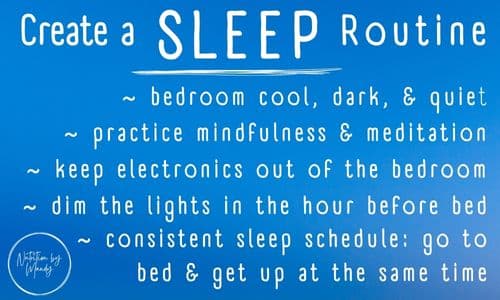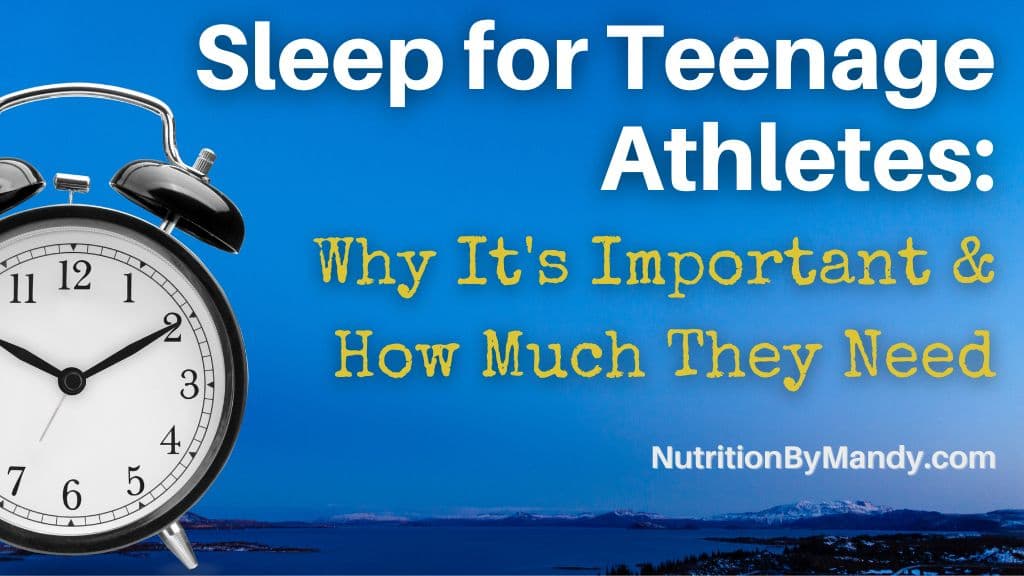Sleep for Teenage Athletes: Why It’s Important & How Much They Need
*This article includes affiliate links. As an Amazon Associate, I earn from qualifying purchases.
With school, practice, and game schedules, teenage athletes are busy. Unfortunately, sleep often gets neglected as schedules fill-up.
Adequate sleep for teenage athletes is critical, not only for performance, but also to support the teen’s physical and mental well-being.
Importance of Sleep for Teenage Athletes
Sleep is essential for optimal physical and mental health in teenagers.
Getting adequate sleep each night is associated with improved attention, memory, learning, and the ability to regulate emotions (1). In addition, adequate sleep is important for supporting a healthy immune system.
In adolescents and teenagers, lack of sleep is associated with attention and behavior problems, impaired decision making, and difficulty concentrating. All of these can negatively impact academic performance.
Sleep and Mental Health
Getting the recommended amount of sleep each night is important for promoting the mental well-being of teenage athletes.
Inadequate sleep is associated with increased feelings of anxiety and depression. Teenagers getting insufficient sleep are also at an increased risk for self-harm behavior (1), as well as mental health and substance abuse concerns.
Sleep and Athletic Performance
When it comes to athletic performance, inadequate sleep is associated with difficulty concentrating, slowed-reaction time, fatigue, and an increased risk of injury.
During sleep the body heals and repairs, which is essential for muscle growth and recovery from exercise sessions.
How Much Sleep Does a Teenage Athlete Need?
Despite the importance of sleep, 7 out of 10 high school students do not get adequate sleep each night (2). The amount of sleep an athlete needs each night varies by age.
The American Academy of Sleep Medicine recommends the following (1):
- Youth 6-12 years old: 9-12 hours of sleep per night
- Teenagers 13-18 years old: 8-10 hours of sleep per night

Is Too Much Sleep a Concern?
In addition to concerns related to teenagers not getting enough sleep, too much sleep can also be problematic.
Routinely sleeping over the recommended amounts is associated with the development of chronic diseases, such as diabetes and hypertension, obesity, as well as mental health concerns (1).
Tips to Improve Sleep for Teenage Athletes
If your teenage athletes are not getting enough sleep, here are some tips to help improve their sleep habits.
Importance of a Consistent Sleep Routine for Teenage Athletes
Teen athletes should aim to go to bed and get up at the same time every day, even on the weekends. The consistent routine will help their bodies body develop a regular sleep cycle.
Developing a consistent schedule is an important sports nutrition concept as well. Teen athletes should not sleep in on the weekend and miss the chance to fuel their bodies with a nutritious breakfast.
Creating a relaxing routine before bed can positively impact sleep. Ideas for a relaxing bedtime routine that teens can consider include:
- Reading a book
- Taking a warm shower
- Deep breathing
- Practicing mindfulness or meditation
- Gentle stretching
- Journaling
Ideal Sleep Environment
Teen athletes can create an ideal sleeping environment by keeping the bedroom cool, dark, and quiet. They should start dimming the lights in the hour before bed to help prepare their bodies for sleep.
In addition, teens should use their beds for sleeping only; not for watching TV, playing video games, or doing homework.
Limit Electronics Before Bedtime
Limit the use of electronics electronics in the hour prior to going to bed.
Electronics emit blue light which can impact sleep. It is best to keep all electronics, including TVs, smartphones, computers, and tablets, out of the bedroom.
Consider purchasing blue light blocking glasses (available on Amazon) for your teen to wear in the evening. This can be particularly helpful if your teen uses a computer or tablet for completing homework before bed.

Use Caution with Caffeine Close to Bedtime
Caffeine is a stimulant, which can impact a teen’s ability to fall asleep and to stay asleep throughout the night. Although athletes differ in their sensitivity to caffeine, it is recommended to avoid caffeine at least 6 hours prior to bed to support optimal sleep (3).
Thus, in the hours leading up to bedtime, teenage athletes should limit food and drinks that contain caffeine. This includes caffeinated beverages such as coffee, soda, and black tea.
Energy drinks contain caffeine along with other ingredients that have a stimulatory effect on the body. When teenage athletes consume energy drinks they may experience insomnia and have difficulty sleeping.
Teenage athletes should be advised to avoid energy drinks. The combination of ingredients in the drink may have a synergistic effect in the body and lead to health concerns.
Can Naps Help Teenage Athletes?
Naps can be a great way to help teenage athletes get in some extra rest during the day and supplement their nighttime sleep.
Taking a 20-30 minute power nap during the afternoon can help teens feel more energetic the rest of the day. When planning a time to nap, teen should make sure it is not too close to bedtime. A nap too close to bed can disrupt their nighttime sleep.
Naps may be particularly beneficial to athletes who routinely have early morning workouts (4). Getting in an afternoon power nap can help decrease sleepiness and increase mental alertness.
Sports Nutrition: Fueling Around Sleep for Teenage Athletes
Teenage athletes can support their sports nutrition goals by carefully planning evening snacks and starting the day with breakfast.
Evening Snacks for Teenage Athletes
Eating an evening snack that contains a good source of protein can be advantageous for athletes desiring to gain or maintain muscle mass. Consuming protein before sleep can help promote muscle protein synthesis during the overnight recovery period (5).
Evening snack ideas that contain protein include:
- Greek yogurt
- Cottage cheese
- Fruit smoothies
- High-protein milk with a peanut butter and jelly sandwich
- High-protein waffles and muffins
Capitalizing on a nutritious evening snack can give teens the nutrients they need to recover and to be ready to perform at their best the next day.
Start the Day with Breakfast
Before heading to morning practice, it is important for teenage athletes to start the day with breakfast. After sleeping 8-10 hours, your body is in need of energy to support your normal daily activities, athletic practices, and academic performance at school.
Plan for your breakfast to include a good source of carbohydrates along with lean protein. Breakfasts teenage athletes can eat on the go include:
- Fruit and yogurt parfait: Greek yogurt, frozen berries, granola
- Bagel with nut butter, sliced banana, and honey
- Kodiak Cakes® toaster waffles, fresh fruit cup, milk
- Granola bars, nut butter, apple slices, milk
- Overnight Oats
Make Sleep a Priority
Bottom line, it is important for teenage athletes to make sleep a priority. Regularly getting the recommended amount of sleep can support teenage athletes mental and physical well-being, as well as their athletic performance. As an athlete, sleep should be an essential part of your performance plan.
If you have additional sports nutrition questions, consider visiting with a sports dietitian nutritionist who can develop an individualized meal plan to meet your sports nutrition needs. For additional guidance of fueling your body for competition, check out my blog: Your Guide to Game Day Nutrition.
Join the Nutrition By Mandy Email List & Get a Free Athlete’s Grocery List
Click HERE to join the Nutrition By Mandy e-mail list. When you join you will receive a free athlete’s grocery list to print and take with you to the store.
About the Author
Mandy Tyler is a Sports Dietitian Nutritionist in the San Antonio, TX area. She is a Registered and Licensed Dietitian, a Board-Certified Specialist in Sports Dietetics, a Licensed Athletic Trainer, and is a Certified Exercise Physiologist through the American College of Sports Medicine. Mandy has experience working with athletes at the high school, collegiate, and professional levels. She believes the key to reaching one’s full potential, both in everyday life and in sports performance, relies on a healthy nutritional foundation.






